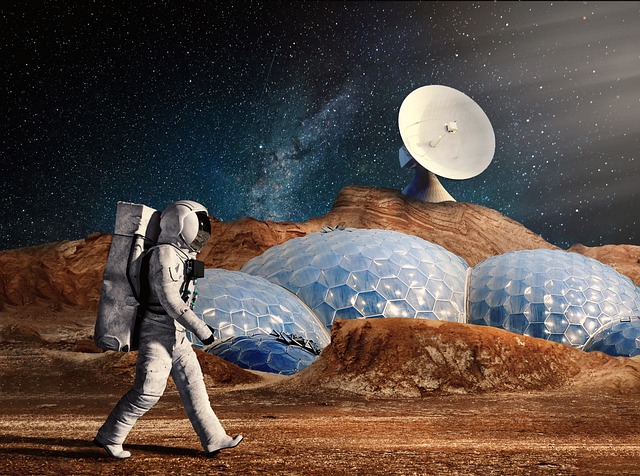— Biotope-One to Man-One, do you copy?
— Alright, Jeff, no need for the codes. It’s not like we’re swarming with people on this godforsaken planet!
— Okay, don’t get mad! So, what’s it looking like?
— Give me five minutes, I’ll take a look.
I move closer to the satellite dish. Once again, we’re disconnected. No communication possible with Earth. I’m outside trying to fix it. My suit feels like it weighs a ton, and it’s hard to handle the tools. The gloves make precise movements nearly impossible. I’d give anything to be somewhere else right now. As usual during extravehicular activities, I can’t see a thing. My vision is obscured by the ochre dust the wind keeps pelting in my face, as if mocking me—mocking us—as if the idea of humans colonizing Mars was laughable. To make matters worse, daylight is fading.
I bend down, my headlamp illuminating the antenna’s control panel. I examine it, tinker with it, trying to tighten the connection cables. “Argh! I’m so done with this!” I angrily toss my wrench aside. That damn sensor is acting up again. Dead! It’s really fried this time. No solar charging without the sensor, which means no battery power. On top of that, the wires are barely holding, which explains why we can’t operate the antenna remotely. We’ve been patching it up for months now. Damn toxic wind! I feel defeated. No point in spending more time here. Heading back seems like the smartest choice before I freeze completely. There’s nothing I can do for now. We’ll have to organize a mission to bring this junk back to the workshop.
— Man-One to Biotope-One? Calling Jeff to report my status.
— Ha-ha! Now you’re using the codes too.
— Grr, force of habit! I hear him chuckle softly. He seems to be handling the mission better than I am.
— So, what’s the verdict? Can you fix it, genius?
— No, it’s done for. I’m coming back, and we’ll need a team to haul the antenna to the workshop. I just hope we still have compatible parts.
— Damn! Pff, okay, I’ll talk to the others and figure out how we’re going to handle this.
— See you in a bit.
I pivot and head back toward the biotope. I glance up to gauge the path ahead—even short distances are a pain to cover here. In the sky, I can see the two moons, Phobos and Deimos, and stars starting to appear. I search for our blue planet. With some focus, I know I can spot it. It’s not the same as a true Earthrise from the Moon, but it’s a comforting image that warms my heart. I think back to that NASA photo published over sixty years ago that made me dream as a young boy. Back then, embarking on an interstellar mission seemed insane, impossible, an unattainable goal. And yet, I did it. Now, I can’t help but think how some childhood dreams can turn into nightmares once they’re realized. Bitterness washes over me.
It’s been three years since I started this extraction mission on Mars. Three years and eight months since I left home. The sensor that allows us to communicate with Earth is broken again. We can’t generate enough energy to fuel the rocket engines for a return trip. For now, we’re stuck. Stranded on this barren, lifeless planet. Cold. The lack of communication with Earth only deepens my solitude, my isolation—and that of my team. Alongside my five companions, each of us has a genetically enhanced genome, designed, tested, and optimized using CRISPR/Cas technology to endure this kind of mission with minimal psychological distress. We’re built to have steel minds and peak physical performance, yet it’s not enough. Superhumans still too human. Despite all our enhancements, we suffer from being too long away from our kind. We suffer from the distance. We suffer from the lack of connection, the lack of communication. This damned breakdown is going to escalate into a crisis very soon. I sigh.
The biotope door opens and seals shut behind me with a familiar click. I remove my suit and set my oxygen tanks to recharge. I’m still tense and irritated, but already feeling lighter. I take a deep breath and run my hand through my hair. My mood is darker than usual. We must find a way to repair the connection to communicate with Earth and organize the return mission. It’s becoming urgent—especially for me.
I walk down the sloped hallway toward the living quarters. We live below the surface to avoid the sun’s deadly rays, which would kill us. We’ve created a biotope: white light, plants, fruits and vegetables grown hydroponically, warmth, recycling, oxygen and water production, small animal husbandry. Life is possible, but minimal. I head toward my room, not ready to face the others yet. I need to calm down first. In this confined environment, negative emotions are a threat to survival—they hinder collaboration and teamwork. They endanger all of us.
In the hallway, I hear him approaching. A wave of warmth and love surges within me. I crouch down to greet my dog. He’s the station’s Labrador, and he made the journey with us as a puppy. He’s genetically modified too, to live longer. He’s the scientists’ solution to preserve our humanity. I think it’s working. I feel it now, in this moment, in the smile on my face. Harold looks at me with his gentle eyes, a ball in his mouth, ready to play. I give him a big pat and eagerly grant his request.
Rose Lorang

